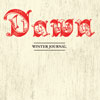Phil Elverum, "Dawn: Winter Journal"
 Of all the reasons to visit Bodo Norway, personal crisis must be among the rarest. Nevertheless, in 2002 Phil Elverum (of Mount Eerie and the Microphones) spent the winter there to recover from a personal and artistic meltdown. Not one for a simple vacation, he stayed alone in a cabin a few hours outside the city. He passed the time writing songs, reading, and putting down his thoughts in a journal. Those journal entries make up Dawn, along with a collection of cartoons, photographs, and a CD of music he recorded during his stay.
Of all the reasons to visit Bodo Norway, personal crisis must be among the rarest. Nevertheless, in 2002 Phil Elverum (of Mount Eerie and the Microphones) spent the winter there to recover from a personal and artistic meltdown. Not one for a simple vacation, he stayed alone in a cabin a few hours outside the city. He passed the time writing songs, reading, and putting down his thoughts in a journal. Those journal entries make up Dawn, along with a collection of cartoons, photographs, and a CD of music he recorded during his stay.
Despite its setting, Dawn is more a personal meditation than a nature journal or travelogue. Elverum writes as much about inner turmoil as he does about living in the woods. His trip is an attempt to “live out the mythologized version” of his life, but it is also an attempt to escape his emotional problems. Prior to leaving, he had broken up with a long term girlfriend, and then found out that she and his best friend had become romantically involved. Like a Taoist hermit, he tries to find tranquility in nature, but he is unable forget the world and the people he wants to abandon. “Most of my thoughts while collecting [firewood] or watching the moon sneak across the hill are about vengeance, TV, or insignificant details”, he complains, “Where’s the big feeling?”
Although Elverum’s pain is easy to understand, it does not make for easy reading. His resentment and self pity, at his relationships and at his own failed idealism, become hard to bear. It is a relief when he relaxes into a practical routine and begins to appreciate the beauty of his environment. His cabin overlooks the fjords and islands of the Arctic Sea, turning simple chores like getting the mail or chopping wood into moments of minor enlightenment. “It feels good just to move the legs,” Elverum writes, “I’m not expecting to SEE anything besides rocks, water, and the occasional birch…it’s just really nice to have the background slowly change without you really noticing.”
Away from the obligations of his work and social life, Elverum has plenty of time to explore the countryside. Rambling alone through the mountains, he finds traces of the wild, poetic Norway that he traveled to experience. On day he meets a Sami tracking reindeer on skis. The ease with which the herdsman travels through the snow provokes Elverum’s admiration. “I felt like such a city person, struggling through the snow with my cumbersome tourist credentials” he confesses, “I’m no graceful reindeer herder. I put out CDs.”
Elvrum’s journal is the centerpiece of Dawn, but the music, photos, and drawings that accompany it are much more appealing. Many of the songs he recorded in Norway have already been released, some for the better part of the decade. But Elverum’s raw emotions and spare accompaniment make these versions worth a listen. His wounded disillusionment is easier to take in three minute folk songs than it is over the space of 129 pages. In his lyrics, Elvrum expresses a sense of traveling both physically and emotionally, that living in the world can be painful but it offers beauty and even answers to our deepest problems. By writing about the worst parts of himself, Elverum denies us that kind of resolution, however bittersweet it may be. His music has always conveyed the kind of wisdom gathered from watching nature without ego, but his prose does not have that sense of self proportion. Perhaps if Elverum was a better student of his own art, Dawn would be much easier to read.
samples:



